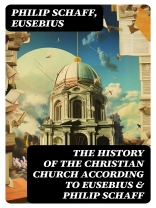The History of the Christian Church According to Eusebius & Philip Schaff offers an illuminating journey through the annals of early Christianity. This anthology captures the diversity of theological thought and historical narrative by juxtaposing the pioneering writings of Eusebius, the first to document the church’s formative years, with Philip Schaff’s comprehensive analysis of its progression through later centuries. Through its pages, readers encounter a broad range of literary styles—from the ancient, laconic accounts of charters and martyrs to the eloquent, analytical prose of Schaff. The collection’s thematic focus on the evolution of Christian theology and practice is enriched by selected standout treatises that invite readers to explore foundational questions of faith and doctrine. Eusebius and Schaff, each in their respective eras, embody the scholarly rigor and interpretive genius necessary to trace Christianity’s sprawling history. Eusebius, as a cornerstone of early church historiography, provides a perspective grounded in proximity to the apostolic age, while Schaff, a leading figure in 19th-century church history, offers insights shaped by a burgeoning historical-critical method. Together, they mirror the shifts in historical, cultural, and ecclesiastical developments, illuminating how the foundational narratives have influenced, and been influenced by, the wider historical context. This compilation is an indispensable resource for both scholars and inquisitive readers eager to engage with the multifaceted history of the Christian church. With its expertly curated texts, the anthology allows readers to explore a panoramic tableau of Christian thought and history, drawing connections across time and cultural perspectives. Delve into this volume to gain invaluable insights into the theological dialogues spanning centuries, and to appreciate the complexities of Christian traditions that continue to resonate today.
Mengenai Pengarang
Philip Schaff (1819–1893) was a renowned church historian and theologian, whose scholarly works left a lasting impact on the study of Christianity. Born in Chur, Switzerland, Schaff displayed an impressive proficiency in academics that led him to pursue theology. He studied under some of the most notable theologians of his time in Germany, which shaped his ecumenical perspective and theological approach. He emigrated to the United States in 1844 and became a prolific author, educator, and ecclesiastical scholar. Schaff’s commitment to a universal Christian church and his reverence for historical accuracy crystallized in his seminal work, ‘The History of the Christian Church’. This extensive eight-volume series is a testament to Schaff’s meticulous research and balanced historical narrative, chronicling Christian history from the apostolic age to the Reformation. Schaff’s methodological approach combined rigorous analysis with a narrative style that made his work accessible to scholars and lay readers alike. His contribution to Christian historiography is noteworthy for its attempt to bridge divisions among Christian denominations, affirming his conviction that the unity of the church did not negate its diversity. Schaff’s legacy continues to influence ecclesiastical scholarship, marking him as a key figure in both the academic study of church history and in efforts to encourage dialogue among various Christian traditions.












